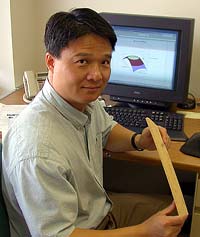
New research led by a University of North Carolina at Chapel Hill scientist shows for the first time how Mycobacterium tuberculosis, the germ responsible for TB, uses a system for releasing proteins to help it survive the lungs’ immune defenses to spread and cause disease.
The study, published online in the April issue of Molecular Microbiology, also adds crucial new knowledge to the molecular factors that underlie the virulence of M. tuberculosis and may aid development of new, target

Anyone who buys a swayed plank of wood has to be, well, warped.
But a Texas forestry sciences researcher may have a straight-forward computer model just around the bend, saving millions for wood manufacturers and consumers.
t
“Wood is an old material that has been used in construction for thousands of years,” said Dr. Zhiyong Cai, Texas Agricultural Experiment Station forest products researcher. “Every place in the world uses wood products, but there still are things we don

Sunlight can convert triclosan, a common disinfectant used in anti-bacterial soaps, into a form of dioxin, and this process may produce some of the dioxin found in the environment, according to research at the University of Minnesota. The researchers said that although the dioxin was a relatively benign form, treating wastewater with chlorine could possibly lead to the production of a much more toxic species of dioxin. The study is in press in the Journal of Photochemistry and Photobiology A: Chemist

Millions of people suffering from diabetes mellitus may be spared the ordeal of pricking their fingers several times a day to test blood sugar levels, thanks to a breakthrough by University of Pittsburgh researchers who have developed a non-invasive method to measure the glucose level in bodily fluids.
Researchers Sanford A. Asher, Ph.D., professor of chemistry in the faculty and College of Arts and Sciences, and David Finegold, M.D., professor of pediatrics in the School of Medicine, creat

Study sheds light on potential bioterror agent, Coxiella burnetii
Scientists at The Institute for Genomic Research (TIGR) and their collaborators have deciphered and analyzed the complete genome sequence of Coxiella burnetii, a potential bioterror agent that causes Q Fever.
C. burnetii, which was first isolated as the cause of Q Fever in Australia in 1937, is typically found in farm animals but also infects humans, including an epidemic that sickened many soldiers in Europe

A team of theoretical physicists working at CERN and the Technion Institute of Technology in Israel has developed a theory to account for the mysterious gamma ray bursts that come from the depths of the Universe. According to their ideas, gamma ray bursts are linked to supernovae, the cataclysmic explosions of massive stars at the end of their lives. When a new gamma ray burst (GRB 030329) was seen on March 29 2003, the CERN-Technion team immediately predicted that light from a supernova would first

– new calculation confirms standard model of particle physics. Contribution of hadronic vacuum polarization determined with unprecedented accuracy. The magnetic moment of the muon is an important precision parameter for…
Technique may prevent formation of unwanted waves that siphon off needed energy. Heating plasma to the ultra-high temperatures needed for fusion reactions requires more than turning the dial on a…

An international team of astronomers, led by researchers from the Astronomical Observatory of the University of Warsaw, have identified a new class of cosmic X-ray sources. The findings have been…

How deubiquitinases USP53 and USP54 cleave long polyubiquitin chains and how the former is linked to liver disease in children. Deubiquitinases (DUBs) are enzymes used by cells to trim protein…

Conceptual blueprint to analyze experimental catalyst data. Machine learning (ML) models have recently become popular in the field of heterogeneous catalyst design. The inherent complexity of the interactions between catalyst…

Antibody that Neutralizes Inhibitory Factors Involved in Nerve Regeneration Leads to Enhanced Motor Function after Acute Spinal Cord Injury. Researchers at 13 clinics in Germany, Switzerland, the Czech Republic and…

How simulations help manufacturing of modern displays. Modern materials must be recyclable and sustainable. Consumer electronics is no exception, with organic light-emitting diodes (OLEDs) taking over modern televisions and portable…

“Neurons that fire together, wire together” describes the neural plasticity seen in human brains, but neurons grown in a dish don’t seem to follow these rules. Neurons that are cultured…

The quest for sustainable energy solutions has been a major focus of scientific research for decades. Solar energy, a clean and renewable source, has emerged as a promising alternative to…

With a processing speed a billion times faster than nature, chip-based laser neuron could help advance AI tasks such as pattern recognition and sequence prediction. Researchers have developed a laser-based…

New technology could remotely identify various types of plastics, offering a valuable tool for future monitoring and analysis of oceanic plastic pollution. Researchers have developed a new hyperspectral Raman imaging…

Artificial Intelligence (AI) has established a strong presence across industries, large and small. The “VoBaKI” research project has empowered small and medium-sized enterprises (SMEs) with an innovative tool to independently…